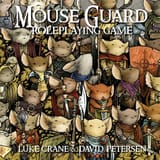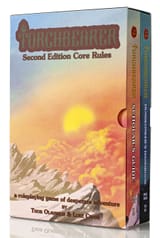>>96214682 (OP)
Luke Crane is a man with awesome ideas, terrible formatting, overly dense writing, and somewhat unintuitive methods of conveying his ideas in practice. Readers have to do a lot of heavy lifting.
Mouseguard is an upgrade to Burning Wheel in readability. The core mechanic is simple. Get a dice pool of D6's and 4+ is a success.
Combat uses his "Fight! Fight! Fight!" mechanic from BW. You choose 3 actions in secret (as does your opponent) and reveal them. Depending on the interaction you either roll separately (both can succeed or fail), roll an opposed test (highest wins), or feint bullshit (feint prevents defense). There are social analogues to this for social combat. Goal is to increase "disposition", an abstraction of your position in the conflict, reducing your opponent to 0 triggers a compromise favorable to the winning team's disposition based on how much disposition the winner lost. This triggers a major compromise (you won but at a major cough) to minor compromise (you won with little cost). For example, you're fighting and death is on the line as a possible outcome (say you're fighting a snake) and you win but only have a few points of disposition left... you kill the snake but its body pins you to the ground. You'll starve unless your friend finds you.
It's very narrative and BW clearly inspired some ideas used by PbtA (and later FitD systems). A lot of the game is played sort of "negotiating" the possible consequences between the GM and the player. I like the idea and I love some of the ideas in the book (particularly beliefs, instincts, etc. And the stat "Nature" which is basically how much of a mouse vs person you are) but in practice I found it somewhat clunky to use.
>>96214754
Torchbearer is the more polished system. It's also a very different experience (heavy focus on "the grind" and condition management).
Midwits like me prefer Mausritter if the theme is important (playing a Redwall-style game).





